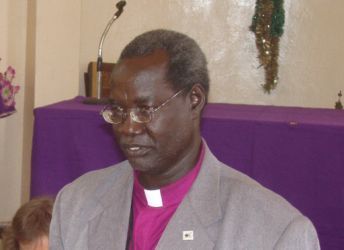Archbishop of ECS appeals for support to facilitate church’s role during referendum
By James Gatdet Dak
August 18, 2010 (JUBA) – The Archbishop of the Episcopal Church of the Sudan (ECS), Rt. Rev. Daniel Deng Bul, has appealed to the leadership of the Government of Southern Sudan (GoSS) to support the church in order to successfully play its expected role of peace building and civic education among the people in preparation for the upcoming referendum in the South.

The appeal came during a meeting between his Lordship and the Vice President, Riek Machar Teny, in his office on Wednesday. The Archbishop told the Vice President that he also came to congratulate him on his relentless efforts for the nation and encouraged the leadership to continue to stay focused and cross the people of Southern Sudan to the Promised Land.
Bishop Deng in particular appealed to the leadership to facilitate the activities of the church to play the role of messenger in promoting peace and healing the hearts of the people across the region. The Archbishop, who is also a citizen of Jonglei state, briefed the Vice President on his recent peace mission initiatives in his home state, which said, covered a number of the state counties.
The top priest said he has decentralized the church into six zones in the whole country, with five Bishops in charge of each zone. He also informed the Vice President about the church’s plan to soon hold a conference in the Ugandan’s capital, Kampala that will see participation of up to 400 Bishops from all over Africa. The conference, he said, would also discuss the upcoming referendum on Southern Sudan’s independence and how to help resolve the expected challenges.
On his part, Machar appreciated the church’s initiative, which he said was always strong in diplomacy as was seen during the peace process which helped brought about the Comprehensive Peace Agreement (CPA) in 2005, describing the priests as ambassadors for peace. Priests from other major Christian denominations such as Catholic Church and Presbytery Church had also played role in peace building in the country.
He also briefed the Archbishop on the status of the formation of the Southern Sudan Referendum Commission and the contentious issue of nomination of its Secretary General, which he said was being resolved. He also briefed him on the work of the Southern Sudan 2011 Taskforce established by President Salva Kiir Mayardit, under the chairmanship of the Vice President, to prepare the region for the conduct of the plebiscite.
The Taskforce, he said, would support church and civil society organizations that are actively playing the role of contributing to the process, particularly in the area of civic education or mobilization of the eligible voters. These will include, he further explained, civil society organizations in the Diaspora, especially those that operate in the eight selected foreign countries where the referendum vote will also take place.
The Vice President told the religious leader that the current insecurity situation was compounded by the armed civilians who take laws into their own hands, resulting to inter-ethnic clashes. Another challenge, he added, is the recent rebellion by officers against the government.
He however revealed that the recent Juba meeting of the Political Bureau of the ruling party; the Sudan People’s Liberation Movement (SPLM) has decided to approach all the individuals who have rebelled with the aim to reconcile with them. Machar also revealed that the SPLM has conceded that the post of the Secretary General of the Southern Sudan Referendum Commission will be a nominee from the National Congress Party (NCP) – a position that has caused delays in the referendum process. He also said that the SPLM will nominate the Deputy Secretary General that will be based in Juba with the Southern Sudan Referendum Bureau – the branch of the Khartoum-based Commission.
He also urged the church leader to play an active role in persuading the populations to hand over their guns to the authorities and have confidence in the security system set up by the government in the form of the organized forces to protect them and their properties.
On North-South borders and post-referendum arrangements, he explained to the spiritual leader that it is in the interest of his government to reach an agreement on the issues before the conduct of the referendum. He however said the referendum should be conducted even before any agreement is reached; saying there is no direct link between them and the referendum and should not hold the referendum hostage.
On citizenship, Machar however said there was need to agree on the question of citizenship before the referendum so that the two parties agree on the future of southerners and northerners residing in the two regions in the event of the South voting for separation.
On the issue of currency – which is now the Sudanese pounds for both North and South – he also explained that it is important to reach an agreement soon on the future of the currency in case the South votes for separation. He explained that some people with bad intention in the North may want to change the Northern currency overnight from the Sudanese pounds to another currency and dump all the Sudanese pounds to the South with the aim to make the Southern economy collapse.
(ST)
